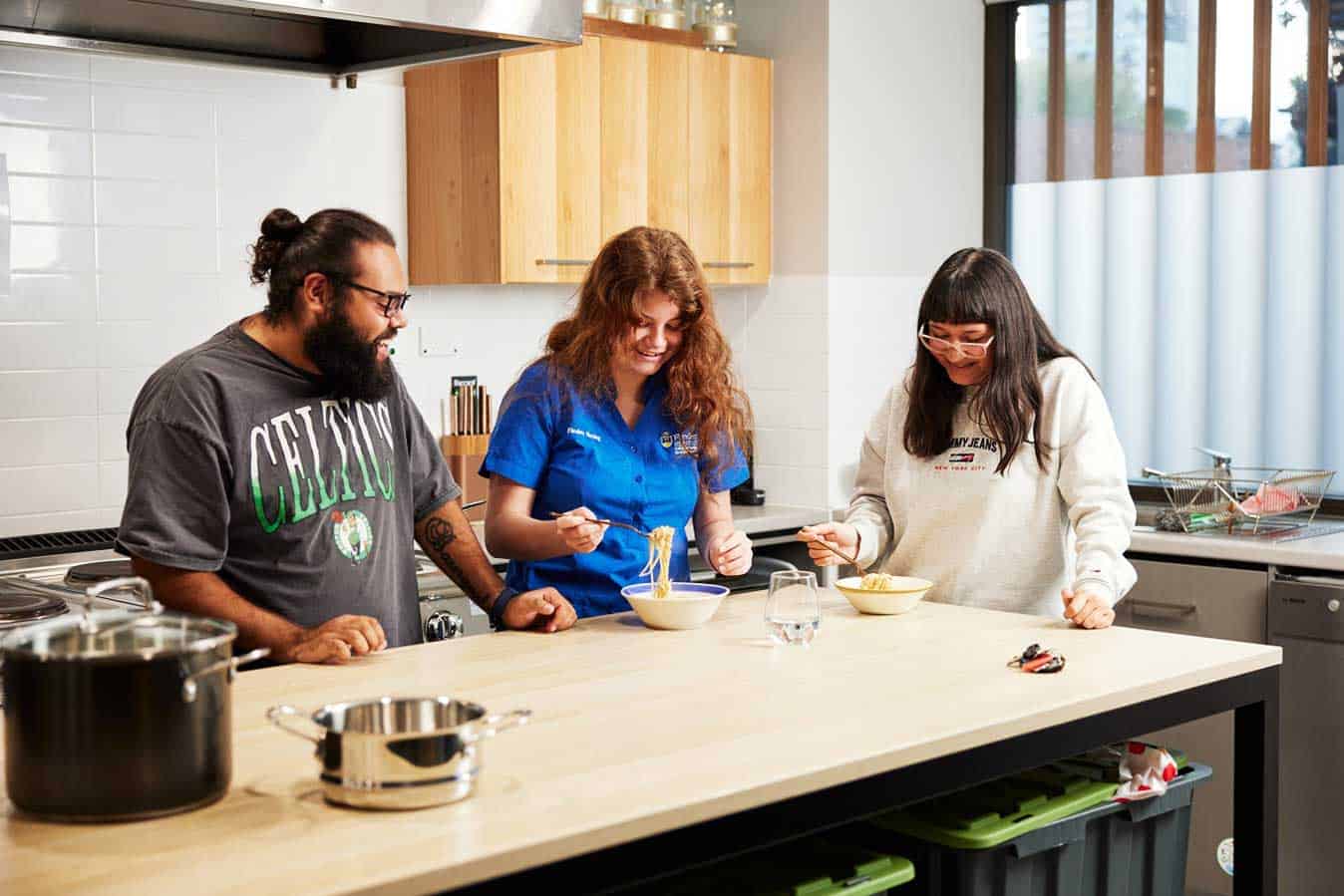A unique housing initiative in South Australia is helping remote Aboriginal and Torres Strait Islander students to study higher education in the city and forge career pathways.
Tika Tirka is an accommodation service in the heart of the Adelaide CBD, enabling post-secondary students from remote and regional locations to undertake further education and training.
“It’s based on a model to support students with the best opportunity to be successful in their education and learning, allowing young Aboriginal people to independently live and study in a metropolitan environment while fulfilling their cultural and heritage needs,” says Tika Tirka Community Development Officer Elijah Bravington.

Tika Tirka is built on Kaurna Land and dedication of the building name in Kaurna language means to sit/stay and learn.
A unique project since 2019, Tika Tirka has the support of schools, tertiary and vocational providers, key Aboriginal staff and leaders in state government and the not-for-profit sector, families and current students.
Pania and Tailesha are first year students enrolled in a Bachelor of Nursing at Flinders University and residing at Tika Tirka. Both were directed to the housing initiative from the university.
“It’s been good to meet new people and connect with other Aboriginal people in the same situation, away from home studying, not on country,” says Tailesha.
One of the key benefits of Tika Tirka is living in a safe and secure environment while also being part of a culturally supportive and welcoming community, says Mr Bravington.
“Getting people to start at the same time in the same course where they are able to form linkages shows statistically a higher success rate [for students to continue studying],” he says.
Pania is from Riverland, along the Murray River, a couple of hours north-east of Adelaide. She has grandparents who live in Adelaide. Tailesha’s family all live in the Northern Territory, she has developed a bond with Pania, having both started nursing at the same time.
“I moved to a different state – from Alice Springs to Adelaide. It’s been a great opportunity but it’s been stressful – it’s way bigger, like 10 times bigger than home. It took me about six weeks to get comfortable,” says Tailesha. “It’s comforting to know there are others here from home.”

“For me it’s probably making new friends that’s been the best part and having a place to stay down here,” says Pania.
Other current residents living at the 20-bed Tika Tirka facility are studying a wide range of disciplines, including: molecular biology, science, art and Aboriginal culture, medicine, surgery, creative arts, law, information technology, gaming & design, and corrections.
To live at Tika Tirka, you must be a student aged 18-25 years, identify as Aboriginal or Torres Strait Islander, be eligible for ABSTUDY, come from a remote or outer regional community, and be engaged or enrolled in tertiary education.
“In terms of support, in line with the Housing Affordability Policy of the South Australian Housing Authority, tenants are charged 30% of their income for housing and an additional 5% for utilities. Financial counselling is also offered to any tenants who may require it,” says Mr Bravington.
Both Pania and Tailesha were inspired by family to study nursing and their families are immensely proud.
“My Pop is a GP in primary health and community and my Aunty is a nurse in Alice Springs. I hope to work back home in my community in Indigenous health and rural health; I want to care for my community, being someone who understands their point of view,” says Tailesha.
“It was my father who pushed me into nursing, giving me that encouragement I needed. I enjoy caring for people. It’s who I am and where I come from that inspires me,” says Pania.
Both have their first clinical placement in the second half of this year. Tailesha has her placement organised at the end of the year in Alice Springs so that she can stay on with her family over the holiday break.
And both plan to stay at Tika Tirka for the duration of their studies, enjoying the central location to university campuses, public transport and the hub of the Adelaide CBD.
“I’m pretty comfortable here. I love it. The city is close, Flinders Uni is about 30 minutes away by bus ride, lots of shops. We have neighbourhood days, activities and every Tuesday Chef Terry shows us how to prepare and cook food in easy ways.”
Pania concurs “We also have the support of Elijah and Ron. They provide us with support with food, activities and how to get around and things to do in Adelaide.”

Additional support at Tika Tirka includes a Deadly Cheffing Skills program that brings tenants together to cook and share meals. Recently ACHL has partnered with Second Bite to supply fresh fruit, veggies, and bakery foods at no cost.
Additional programs are also run to link the residents with Kaurna cultural knowledge holders. Residents are able to join in a range of personal development programs as well as various community programs and events.
“I don’t think there’s any other place like it in the country. We need to replicate it in other cities and in rural and regional environments,” says Mr Bravington.
“The power of education in people’s lives to help and influence is incalculable – it’s the path to self-determination. We can look after our own mob, it’s the systems that are oppressive.”
Contact Aboriginal Community Housing Ltd or your Aboriginal Student Support unit at your chosen university and let them know you’re interested in living at Tika Tirka.
Email: tika.tirka@achl.org.au
Phone us on (08) 8210 0200








